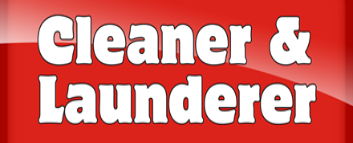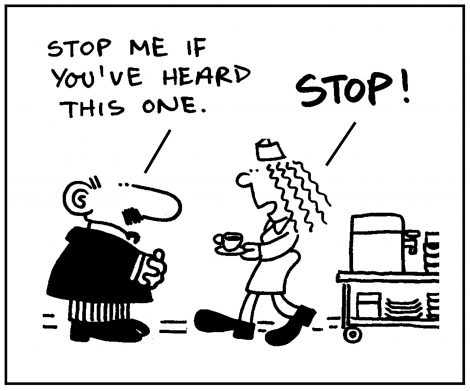“Has your son decided what he wants to be when he grows up?” I asked my co-worker.
“He wants to be a garbage man,” she replied.
“That is an unusual ambition to have at such a young age”, I said.
“Not really. He thinks that garbage men only work on Tuesdays.”
The great humorist Victor Borge once joked that “laughter is the shortest distance between two people.” My husband John and I have been enjoying watching the CNN series History of Comedy. It describes how humor has changed through the years in our society. John is a political junkie, and in a highly partisan time he was thrilled to be able to point out that humor can be viewed as non-partisan. President Dwight D. Eisenhower, a Republican, once observed “a sense of humor is part of the art of leadership, of getting along with people and getting things done.” His successor, John F. Kennedy, a Democrat, offered, “there are three things that are real – God, human folly and laughter. The first two are beyond comprehension. So, we must do what we can with the third.”
With this in mind, how important is humor in the workplace? A Robert Half Company international survey found that, “91% of executives believe that a sense of humor is important to career advancement. At the same time, 84% feel that people with a good sense of humor do a more effective job.” Alison Beard, writing in the Harvard Business Review, points out that working adults are “in the midst of a laughter draught.” Beard learned that babies laugh an average of 400 times a day, while people over the age of 35 only laugh 15 times a day. Beard added that “recent study of Gallup data for the U.S. found that we laugh significantly less on weekdays than we do on weekends.” Our concern is with what happens in the workplace. Beard suggests that a critical aspect of success is to lead with humor. She points out that with “institutions as serious as Wharton, M.I.T. and the London Business School, every chuckle or guffaw brings with it a host of business benefits.” She believes that “laughter relieves stress and boredom, boosts engagement and well-being and spurs not only creativity and collaboration but also analytic precision and productivity.”
Andrew Tarvin, an author, speaker, and self-described “humor engineer,” wrote a wonderful essay entitled 30 Benefits of Humor at Work. He suggests that humor is needed to achieve better results in the workplace. Tarvin offers case studies, real-world examples and extensive research to back up each of the following 30 reasons why humor at work is crucial:
HUMOR . . .
1. Gets people to listen
2. Increases long-term memory retention
3. Increases persuasion
4. Aids in learning
5. Increases the likability of the speaker
6. Connects us with others
7. Reduces status differentials
8. Diffuses conflict
9. Builds trust
10. Encourages people to work together
11. Boosts overall brainpower
12. Improves decision-making
13. Increases the acceptance of new ideas
14. Triggers new connections
15. Enhances one’s ability to solve problems
16. Provides motivation
17. Reduces absenteeism
18. Prevents long-term burnout
19. Increases employee engagement
20. Improves productivity
21. Reduces stress
22. Strengthens the immune system
23. Relaxes muscles
24. Burns calories
25. Increases happiness
26. Enhances perceived leadership skills
27. Creates more opportunities
28. Builds credibility
29. Increases size of paycheck
30. Increases profit.
It is important to remember that good humor requires that we laugh with people, not at them. Harry Emerson Fosdick confirmed this when he said, “Whatsoever you laugh at in others, laugh at in yourself.” Lahle Wolfe, founder and CEO of LA Wolfe Marketing, emphasizes in her article Learn About Humor in the Workplace and the Law, “What may be funny to you could be offensive to someone else. And, when it comes to workplace humor, what you may think is funny could even be illegal. Federal and many state’s laws protect minorities, disabled persons, women and other employees from harassment, slander and discrimination at work. A poorly chosen joke or off-the-cuff remark intended to be funny could cause you legal troubles. There is no clear-cut legal definition of harassment, which makes it easy to file a lawsuit against an employer who participates in, or does not stop, inappropriate behavior in the workplace. Humor should be inclusive to be well-received. Sexist, racist, ageist jokes and crude remarks label certain individuals, or groups of people, as inferior in some way and create exclusions. Not only is this “humor” inappropriate, but offensive, even when not directed at a specific person, and can lead to sanctions, terminations, and lawsuits.”
One of the things that I have learned from my work with Tuchman Advisory Group (T.A.G.) is that humor can bind people together. Virtually everyone has a favorite joke or humorous story. My father, the late Sid Tuchman, founder of T.A.G., collected hundreds of jokes that he used at any appropriate occasion. He taught me the importance of humor in our daily lives. At our T.A.G. meetings, Sid always began with a joke or funny story and I have continued that tradition.
A guy goes in for a job interview and sits down with the boss.
The boss asks him, “What do you think is your worst quality?”
The man says “I’m probably too honest.”
The boss says, “That’s not a bad thing, I think being honest is a good quality.”
The man replies, “I really don’t give a #$%*&@ what you think!”
One way of creating a unified dynamic at a meeting or business event is to have each employee submit a favorite bit of humor and then share it with the group. This will certainly create positive feeling that will help to maintain a welcoming spirit among those who work together on a daily basis. It was John Cleese who hit the nail on the head when he said, “it is not coincidence that the man I know who always has the best stock of new jokes is not a comedian, but a salesman.” Customer service remains the bottom line in continuing to build a successful business. We all have humorous anecdotes that we have gained over the years and enjoy recounting. Telling favorite stories from our industry enhances good feelings as well as the ability to reach out and grow.
Making humor work is a great gift to employ in our daily lives and in the business world. Used properly, everyone is a winner; old customers, new customers, employees, management and the business as a whole. One of my favorite expressions is the slogan “When we work, we work hard. When we play, we play hard.” For T.A.G. business purposes, our slogan might be when we laugh, we laugh heartily, and when we laugh together, we strengthen our businesses.
Humor works and leaves us all with a smile and an upbeat feeling. I always enjoy a good joke or funny story. Please send me your favorite to ellenrothmann@yahoo.com or post online in the comments area of this article.

